联邦动物福利法
美国动物权益法的规定
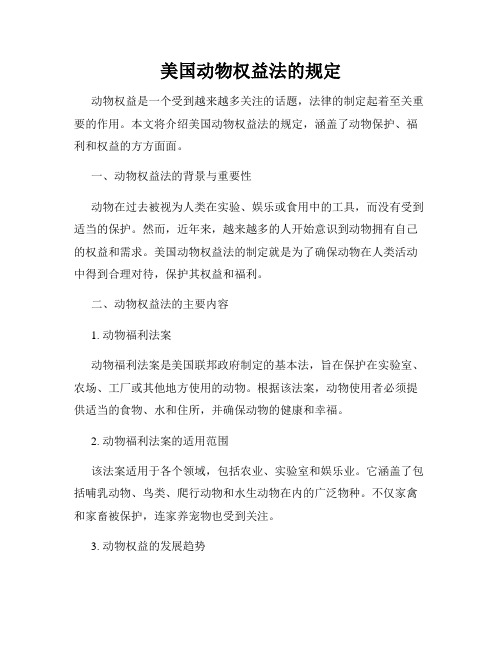
美国动物权益法的规定动物权益是一个受到越来越多关注的话题,法律的制定起着至关重要的作用。
本文将介绍美国动物权益法的规定,涵盖了动物保护、福利和权益的方方面面。
一、动物权益法的背景与重要性动物在过去被视为人类在实验、娱乐或食用中的工具,而没有受到适当的保护。
然而,近年来,越来越多的人开始意识到动物拥有自己的权益和需求。
美国动物权益法的制定就是为了确保动物在人类活动中得到合理对待,保护其权益和福利。
二、动物权益法的主要内容1. 动物福利法案动物福利法案是美国联邦政府制定的基本法,旨在保护在实验室、农场、工厂或其他地方使用的动物。
根据该法案,动物使用者必须提供适当的食物、水和住所,并确保动物的健康和幸福。
2. 动物福利法案的适用范围该法案适用于各个领域,包括农业、实验室和娱乐业。
它涵盖了包括哺乳动物、鸟类、爬行动物和水生动物在内的广泛物种。
不仅家禽和家畜被保护,连家养宠物也受到关注。
3. 动物权益的发展趋势随着人们对动物权益的关注增加,动物权益法的内容也在不断发展。
2018年,加利福尼亚州通过了历史性的动物福利法案,禁止了动物饲养在狭小的空间中。
其他州也有类似的法案出台,以确保动物得到更好的待遇。
4. 动物权益组织和监管机构美国有多个动物权益组织,例如美国动物福利协会(ASPCA)和人道动物协会(Humane Society of the United States)。
此外,美国农业部(USDA)和食品与药物管理局(FDA)等政府机构也负责监督和执行动物权益相关法律。
5. 动物权益法的争议与挑战动物权益法在执行上仍然面临着挑战和争议。
有些人认为,动物权益法的规定还不够严格,无法真正保护动物的权益。
同时,一些相关行业也对更严格的法规感到担忧,担心其可能带来的经济负担。
三、动物权益法对相关行业的影响1. 农业业动物福利法案对农场动物的饲养和屠宰提出了新的要求。
养殖场需要提供更加宽敞和清洁的环境,同时改善动物的生活条件和屠宰方式。
欧盟动物福利政策PPT课件

德国设立联邦食品与农业部下属 的动物福利监管机构,负责全国
范围内的动物福利监管工作。
制定详细法规
德国制定了一系列详细的动物福利 法规,包括饲养、运输、屠宰等各 环节的具体要求。
严厉处罚违规行为
对于违反动物福利法规的行为,德 国采取严厉的处罚措施,包括罚款、 吊销执照等。
瑞典:注重宣传教育引导
欧盟一体化进程
国际贸易与市场竞争
动物福利已成为国际贸易和市场竞争 的重要因素之一,欧盟通过制定相关 政策来提高其农产品的国际竞争力。
欧盟一体化进程推动了动物福利政策 的制定和实施。
政策法规及标准
01
02
03
欧盟动物福利法规
欧盟制定了一系列动物福 利法规,包括饲养、运输、 屠宰等方面的规定。
动物福利标准
03
禁止对动物进行非必要 的痛苦操作,如去喙、 断尾等。
04
鼓励采用更高福利的饲 养方式,如自由放养、 有机饲养等。
运输过程中的保障措施
01
02
03
04
限制运输时间和运输密度,确 保动物有足够的空间和舒适的
环境。
在运输前对动物进行健康检查 ,确保其适合运输。
提供必要的饲料、水和休息, 以减少动物的应激反应。
欧盟制定了严格的动物福 利标准,包括生理福利、 环境福利、卫生福利、行 为福利和心理福利等。
成员国政策差异
虽然欧盟制定了统一的动 物福利政策,但各成员国 在政策执行和监管方面存 在一定的差异。
适用范围与对象
适用范围
欧盟动物福利政策适用于 所有在欧盟境内饲养、运 输、屠宰和加工动物及其 产品的单位和个人。
规和标准。
03
处罚措施
动物福利
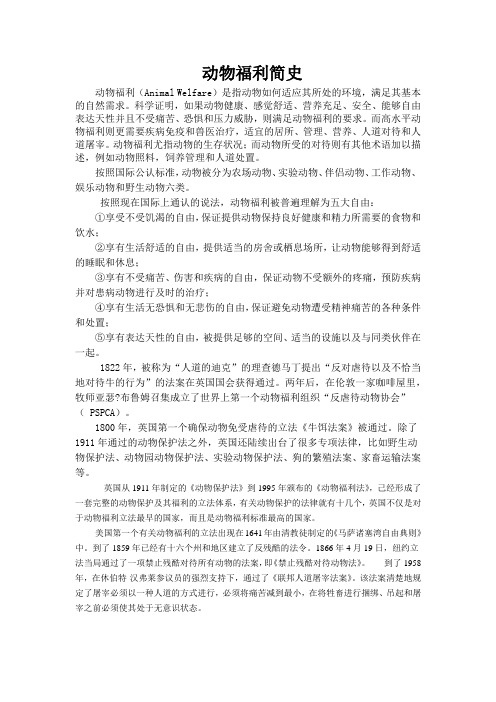
动物福利简史动物福利(Animal Welfare)是指动物如何适应其所处的环境,满足其基本的自然需求。
科学证明,如果动物健康、感觉舒适、营养充足、安全、能够自由表达天性并且不受痛苦、恐惧和压力威胁,则满足动物福利的要求。
而高水平动物福利则更需要疾病免疫和兽医治疗,适宜的居所、管理、营养、人道对待和人道屠宰。
动物福利尤指动物的生存状况;而动物所受的对待则有其他术语加以描述,例如动物照料,饲养管理和人道处置。
按照国际公认标准,动物被分为农场动物、实验动物、伴侣动物、工作动物、娱乐动物和野生动物六类。
按照现在国际上通认的说法,动物福利被普遍理解为五大自由:①享受不受饥渴的自由,保证提供动物保持良好健康和精力所需要的食物和饮水;②享有生活舒适的自由,提供适当的房舍或栖息场所,让动物能够得到舒适的睡眠和休息;③享有不受痛苦、伤害和疾病的自由,保证动物不受额外的疼痛,预防疾病并对患病动物进行及时的治疗;④享有生活无恐惧和无悲伤的自由,保证避免动物遭受精神痛苦的各种条件和处置;⑤享有表达天性的自由,被提供足够的空间、适当的设施以及与同类伙伴在一起。
1822年,被称为“人道的迪克”的理查德马丁提出“反对虐待以及不恰当地对待牛的行为”的法案在英国国会获得通过。
两年后,在伦敦一家咖啡屋里,牧师亚瑟?布鲁姆召集成立了世界上第一个动物福利组织“反虐待动物协会”( PSPCA)。
1800年,英国第一个确保动物免受虐待的立法《牛饵法案》被通过。
除了1911年通过的动物保护法之外,英国还陆续出台了很多专项法律,比如野生动物保护法、动物园动物保护法、实验动物保护法、狗的繁殖法案、家畜运输法案等。
英国从1911年制定的《动物保护法》到1995年颁布的《动物福利法》,己经形成了一套完整的动物保护及其福利的立法体系,有关动物保护的法律就有十几个,英国不仅是对于动物福利立法最早的国家,而且是动物福利标准最高的国家。
美国第一个有关动物福利的立法出现在1641年由清教徒制定的《马萨诸塞湾自由典则》中。
美国动物权益法的规定与实践

美国动物权益法的规定与实践动物权益法在美国的立法和实践中具有重要的地位。
本文将对美国动物权益法的规定进行探讨,并探究美国在实践中保护动物权益方面的举措。
一、动物权益法的规定1. 动物福利法案动物福利法案是美国最早的保护动物权益的立法,要求人们在进行业务或其他类似活动中对动物实施适当的照顾和照料。
根据该法案,禁止人们对动物进行虐待、折磨或残忍行为。
2. 动物福利法动物福利法是美国联邦法律,于1966年通过。
该法案规定了对实验室动物的使用进行监管,要求实验室对动物的使用必须符合合适的照料和条件。
3. 动物进口法动物进口法旨在保护动物免受非法交易和虐待的侵害,在动物进口和交易等方面设立了相应的法律规定和限制。
4. 动物权益法案动物权益法案是美国为保护动物权益而制定的法案之一,该法案强调动物拥有自身权益,要求人们对动物实施合适的照料和保护。
以上是美国动物权益法的一些主要规定,这些法律的制定旨在确保动物能够得到适当的待遇和保护,避免动物遭受虐待和不必要的伤害。
二、美国动物权益法的实践1. 动物保护组织美国拥有众多的专门从事动物权益保护的组织和机构,如美国动物协会(ASPCA)和国际防止虐待动物协会(ISPCA)。
这些组织通过开展救助行动、宣传教育和推动相关法律的修订等方式,为动物提供更好的生存环境。
2. 严格的监管措施美国对动物实验室的使用进行了严格的监管,确保实验动物在实验过程中得到适当的照顾和保护。
此外,美国还设立了专门的动物保护执法部门,负责监督和执行动物权益法的实施。
3. 提倡动物领养为了减少流浪动物的数量,美国积极推广动物领养,并设立了众多的动物收养中心和避难所。
这些中心定期举办领养活动,并提供动物饲养指导,鼓励更多人采取适当的方式帮助无家可归的动物。
4. 健全的法律制度美国动物权益法的实施得到了完善的法律体系的支持。
通过不断修订和完善法律法规,确保对违反动物权益法的行为进行严厉的处罚,提高了法律的执行力度。
美国动物权益法动物福利的法律保障

美国动物权益法动物福利的法律保障美国动物权益法:动物福利的法律保障作为一个发达国家,美国一直致力于保护动物权益,并通过制定法律来确保动物福利。
这些法律的出台旨在保护动物免受虐待、保证其生存和福利。
本文将探讨美国动物权益法的主要内容及其在保护动物福利方面的法律保障。
一、法律背景1.1 美国动物福利法美国动物福利法(Animal Welfare Act)是美国国内最重要的一项法律来保护动物福利。
该法律于1966年通过,后经多次修正和完善,逐渐成为确保实验动物、宠物和动物在展览、表演和运输过程中受到适当照顾的重要法规。
该法律的主要目标是确保动物不受不必要的疾病、痛苦、伤害或精神折磨。
1.2 动物福利法的范围动物福利法适用于许多不同类型的组织和场所,包括但不限于动物实验室、动物展览、宠物店、农场和动物运输。
该法律规定了对动物饲养、保健、饮水、清洁环境、运输和宰杀的最低要求。
此外,法律还禁止了动物的虐待、残酷杀害、非法贸易以及针对野生动物的猎杀和非法捕捞。
二、具体法律保障措施2.1 动物福利标准美国动物福利法通过设立特定的动物福利标准,确保动物在饲养和照料过程中受到适当对待。
这些标准包括但不限于饲养场地面积要求、饲料和水的质量、动物疫苗接种要求等。
这些标准旨在保证动物的基本需求得到满足,并减少因饲养条件不善而导致的伤害或疾病。
2.2 动物实验室的规范美国动物权益法还对动物实验室中的行为进行了细致规范,确保这些实验对动物造成的痛苦和困扰最小化。
例如,在进行动物实验时,必须获得道德审查和批准,实验过程中需要给予动物镇痛或麻醉,同时监管机构进行定期检查,确保实验室设施符合最低要求。
2.3 宠物保护措施美国动物权益法还针对宠物提供了一系列的保护措施。
宠物的饲养、销售和运输都需要遵守法律规定,确保宠物福利得到保障。
例如,法律规定了宠物的合理饲养条件、兽医护理和接种疫苗的要求,禁止宠物的虐待和虐杀行为。
2.4 动物运输条例美国动物权益法还对动物运输制定了严格的规定。
英国动物福利法
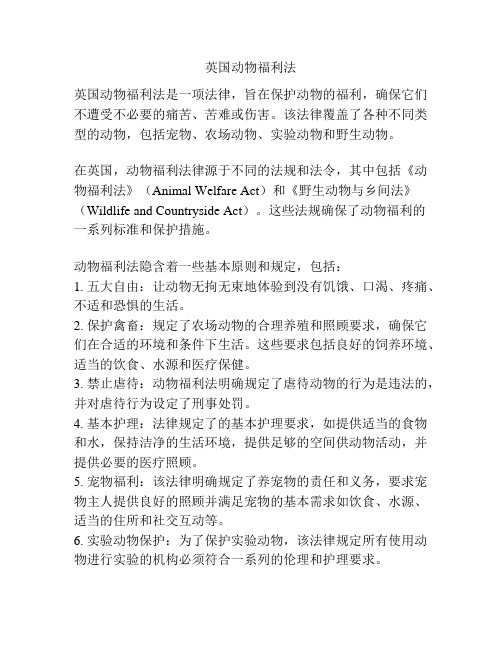
英国动物福利法英国动物福利法是一项法律,旨在保护动物的福利,确保它们不遭受不必要的痛苦、苦难或伤害。
该法律覆盖了各种不同类型的动物,包括宠物、农场动物、实验动物和野生动物。
在英国,动物福利法律源于不同的法规和法令,其中包括《动物福利法》(Animal Welfare Act)和《野生动物与乡间法》(Wildlife and Countryside Act)。
这些法规确保了动物福利的一系列标准和保护措施。
动物福利法隐含着一些基本原则和规定,包括:1. 五大自由:让动物无拘无束地体验到没有饥饿、口渴、疼痛、不适和恐惧的生活。
2. 保护禽畜:规定了农场动物的合理养殖和照顾要求,确保它们在合适的环境和条件下生活。
这些要求包括良好的饲养环境、适当的饮食、水源和医疗保健。
3. 禁止虐待:动物福利法明确规定了虐待动物的行为是违法的,并对虐待行为设定了刑事处罚。
4. 基本护理:法律规定了的基本护理要求,如提供适当的食物和水,保持洁净的生活环境,提供足够的空间供动物活动,并提供必要的医疗照顾。
5. 宠物福利:该法律明确规定了养宠物的责任和义务,要求宠物主人提供良好的照顾并满足宠物的基本需求如饮食、水源、适当的住所和社交互动等。
6. 实验动物保护:为了保护实验动物,该法律规定所有使用动物进行实验的机构必须符合一系列的伦理和护理要求。
除了以上的基本原则和规定,动物福利法还设有一些特殊保护措施,覆盖了特定类型的动物,如:1. 野生动物保护:保护濒临灭绝的野生动物及其栖息地,禁止非法狩猎、贩卖或捕捞野生动物,并设立了保护区域和自然保护区。
2. 海洋保护:法律规定了海洋保护区,并禁止非法捕捞和掠夺性渔业行为,以维护海洋生物的生态平衡。
3. 狗的群体:该法律规定了狗的饲养标准和繁殖要求,以防止滥繁殖和犬只数量过剩。
4. 神灵动物:针对一些宗教或文化活动中使用的动物,法律设有特殊规定,以确保这些活动不会对动物造成不必要的痛苦或苦难。
美国动物权益法保护动物的法律框架
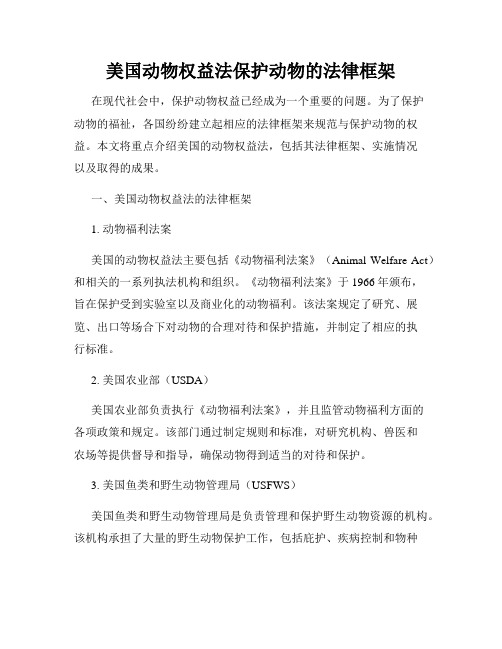
美国动物权益法保护动物的法律框架在现代社会中,保护动物权益已经成为一个重要的问题。
为了保护动物的福祉,各国纷纷建立起相应的法律框架来规范与保护动物的权益。
本文将重点介绍美国的动物权益法,包括其法律框架、实施情况以及取得的成果。
一、美国动物权益法的法律框架1. 动物福利法案美国的动物权益法主要包括《动物福利法案》(Animal Welfare Act)和相关的一系列执法机构和组织。
《动物福利法案》于1966年颁布,旨在保护受到实验室以及商业化的动物福利。
该法案规定了研究、展览、出口等场合下对动物的合理对待和保护措施,并制定了相应的执行标准。
2. 美国农业部(USDA)美国农业部负责执行《动物福利法案》,并且监管动物福利方面的各项政策和规定。
该部门通过制定规则和标准,对研究机构、兽医和农场等提供督导和指导,确保动物得到适当的对待和保护。
3. 美国鱼类和野生动物管理局(USFWS)美国鱼类和野生动物管理局是负责管理和保护野生动物资源的机构。
该机构承担了大量的野生动物保护工作,包括庇护、疾病控制和物种保育等。
他们不仅制定了相关政策和规定,还负责监管下属机构和合作伙伴的实施情况。
4. 国家海洋和大气管理局(NOAA)国家海洋和大气管理局负责保护和管理海洋和沿岸生态系统以及其中的动物资源。
该机构广泛参与海洋生物保护、水域保护和渔业保护等领域的工作,通过法规和精确的管理规定,保护和修复受威胁物种的生态栖息地,以保护动物的权益。
二、美国动物权益法的实施情况1. 动物福利法案的执行美国动物福利法案的执行严格遵循相应的政策和标准。
根据法案规定,实验室、农场和动物繁殖机构等需要进行动物实验或者经营动物的场所,必须向当地的执法机构提交相关的申请和报告。
此外,执法机构对这些场所进行定期的检查和评估,以确保动物的福利得到保护和提高。
2. 执法机构的监督美国农业部、鱼类和野生动物管理局以及其他相关的执法机构都对动物权益法的实施执行进行监督。
动物福利立法的建议

动物福利立法的建议动物福利是保护动物康乐的外部条件。
以下是店铺为你整理的动物福利立法的建议,希望大家喜欢!动物福利立法的建议动物福利的五大自由原则。
(1)动物享有不受饥渴的自由。
保证提供动物保持良好健康和精力所需要的食物和饮水,主要目的是满足动物的生命需要;(2)动物享有生活舒适的自由。
提供适当的房舍或栖息场所,让动物能够得到舒适的休息和睡眠;(3)动物享有不受痛苦、伤害和疾病的自由。
保证动物不受额外的疼痛,预防疾病和对患病动物及时治疗;(4)动物享有生活无恐惧和悲伤的自由。
保证避免动物遭受精神痛苦的各种条件和措施;(5)动物享有表达天性的自由。
提供足够的空间、适应的设施以及与同类动物伙伴在一起。
饲养方面。
根据动物福利的“五大自由原则”,各国规定了饲养过程中保障动物福利的一般标准。
如,应该为动物提供新鲜的食用水及健康的食物;有一个庇护所和舒适的休息区;不得对动物实施虐待;在生病的时候能够得到迅速及时的治疗;有适当大的生活空间及同伴;所生活的环境条件及管理方法不会造成其精神损害等福利。
运输方面。
运输会对动物的应激行为产生重要影响。
各国从运输工作人员、运输工具和运输管理等重点方面釆取措施保障动物的福利。
(1)对运输工作人员的要求。
运输工作人员必须要经过专门的动物运输培训。
在进行动物运输尤其是长途运输时,运输者必须预先考虑到动物在运输中可能受到的痛苦和不安。
在运输前要对动物和运输工具进行检查;在运输途中要对动物进行照料和检查;驾驶员应谨慎,保持车的平稳,避免急刹车和突然停止,转弯的时候要尽可能的慢。
(2)对运输工具的要求。
运输工具要达到一定的标准,应当安装防震装置和隔热通风设备,地板要平坦但不光滑,车的侧面不能有锋利的边缘和突出部分;运输工具上要有足够的水和饲料;规定了最大装载密度和装载方法,运输密度不能过高,地板的面积要足够大,使动物能舒服的站着或正常的休息;要保持运输工具的清洁卫生,定期对运输工具进行消毒,动物的粪便、尿液、尸体和垃圾要及时清除。
德国动物福利法

德国动物福利法1. 德国动物福利法的概述德国动物福利法是一项针对动物福利的法律,旨在保护动物的权利。
该法律要求所有使用动物的人都必须尊重和保护动物的权利,并遵守一定的规定,以确保动物的健康和安全。
该法律规定,所有使用动物的人都必须提供给动物足够的空间,良好的饮食,充足的水,良好的照料,以及适当的休息。
此外,动物的行为也应受到保护,不得受到虐待或滥用。
此外,法律还规定,动物的安全和健康必须受到保护,不得受到任何形式的伤害或损害。
此外,法律还规定,动物的繁殖必须遵守一定的规定,以确保动物的健康和安全。
2. 德国动物福利法的实施德国动物福利法是一项旨在保护动物权益的法律,它的实施将使动物获得更好的照顾和保护。
根据德国动物福利法,动物受到的照顾和保护必须符合一定的标准。
首先,动物必须得到足够的食物和水,以及充足的休息时间。
其次,动物必须得到足够的体力活动,以及有足够的空间来活动。
此外,动物必须得到充分的社会互动,以及必要的医疗照顾。
最后,动物必须得到足够的安全保障,以及足够的安全环境。
德国动物福利法的实施还包括对动物的禁止使用和滥用的规定。
例如,动物不能被用于实验或娱乐,也不能被滥用或虐待。
此外,动物不能被用于商业目的,也不能被用于任何其他形式的虐待或滥用。
另外,德国动物福利法还规定,动物的购买和出售必须遵守一定的规定。
例如,动物的购买者必须提供详细的信息,以便确保动物得到充分的照顾和保护。
此外,动物的出售者也必须提供详细的信息,以便确保动物不会被滥用或虐待。
最后,德国动物福利法还规定,动物的繁殖必须遵守一定的规定。
例如,动物的繁殖必须在符合兽医标准的条件下进行,并且必须确保动物的健康和安全。
此外,动物的繁殖者也必须遵守一定的规定,以确保动物不会被滥用或3. 德国动物福利法的影响德国动物福利法是一项旨在保护动物权利的法律,它规定了动物受到的最低标准,以确保动物得到正当的对待。
这项法律对德国的动物保护有着重大的影响,并且其影响还在不断延伸到其他国家。
哈佛鼠案例的法律法规(3篇)
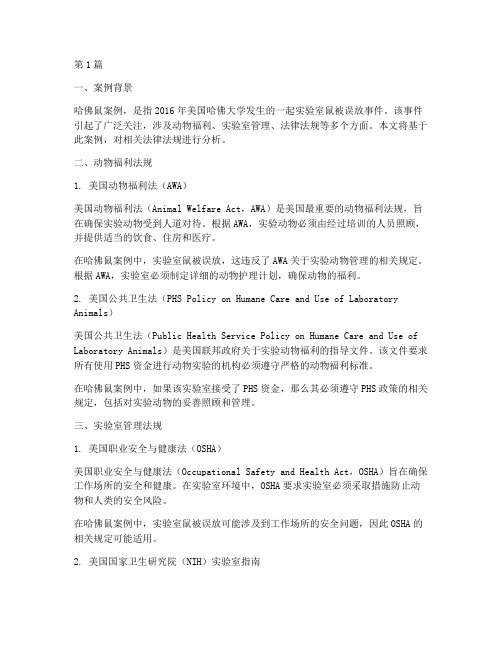
第1篇一、案例背景哈佛鼠案例,是指2016年美国哈佛大学发生的一起实验室鼠被误放事件。
该事件引起了广泛关注,涉及动物福利、实验室管理、法律法规等多个方面。
本文将基于此案例,对相关法律法规进行分析。
二、动物福利法规1. 美国动物福利法(AWA)美国动物福利法(Animal Welfare Act,AWA)是美国最重要的动物福利法规,旨在确保实验动物受到人道对待。
根据AWA,实验动物必须由经过培训的人员照顾,并提供适当的饮食、住房和医疗。
在哈佛鼠案例中,实验室鼠被误放,这违反了AWA关于实验动物管理的相关规定。
根据AWA,实验室必须制定详细的动物护理计划,确保动物的福利。
2. 美国公共卫生法(PHS Policy on Humane Care and Use of Laboratory Animals)美国公共卫生法(Public Health Service Policy on Humane Care and Use of Laboratory Animals)是美国联邦政府关于实验动物福利的指导文件。
该文件要求所有使用PHS资金进行动物实验的机构必须遵守严格的动物福利标准。
在哈佛鼠案例中,如果该实验室接受了PHS资金,那么其必须遵守PHS政策的相关规定,包括对实验动物的妥善照顾和管理。
三、实验室管理法规1. 美国职业安全与健康法(OSHA)美国职业安全与健康法(Occupational Safety and Health Act,OSHA)旨在确保工作场所的安全和健康。
在实验室环境中,OSHA要求实验室必须采取措施防止动物和人类的安全风险。
在哈佛鼠案例中,实验室鼠被误放可能涉及到工作场所的安全问题,因此OSHA的相关规定可能适用。
2. 美国国家卫生研究院(NIH)实验室指南美国国家卫生研究院(National Institutes of Health,NIH)发布了详细的实验室指南,旨在确保实验动物的管理和福利。
宠物繁殖的法律法规解析

宠物繁殖的法律法规解析宠物繁殖作为一项涉及动物福利和人类社会责任的活动,受到许多法律法规的管制和限制。
本文将从不同国家和地区的角度,对宠物繁殖相关的法律法规进行解析,并探讨其中的合规要求和伦理问题。
一、宠物繁殖的法律法规在不同国家和地区的差异在不同国家和地区,宠物繁殖的法律法规存在一定的差异。
以中国为例,宠物繁殖受到《中华人民共和国动物防疫法》、《中华人民共和国农业法》、《中华人民共和国野生动物保护法》等相关法律法规的约束。
这些法律法规规定了宠物繁殖必须具备合法证件、符合动物福利等要求,并对违规行为给予了一定的处罚。
而在美国,宠物繁殖的法律法规则由联邦法和各州法规定。
联邦法方面,美国农业部的《动物福利法》对商业宠物繁殖场设立了标准和监管要求。
各州的法律法规则更加具体,有些州有专门的宠物繁殖法,规定了养殖场的设立和运营要求,以及宠物繁殖者必须具备的证书和许可等。
二、宠物繁殖合规要求与伦理问题无论是中国还是美国等其他国家和地区,宠物繁殖都需要遵守一定的合规要求。
首先,繁殖者应具备相关证照,如经营许可证、兽医执业证等,以确保合法运营。
其次,繁殖场的环境应符合宠物的基本需求,包括饲养空间、饲料质量等,确保动物福利的最基本保障。
此外,宠物繁殖者还需要遵循保健、疫苗注射等方面的规定,确保繁殖的宠物健康无病。
在宠物繁殖过程中,还需要关注伦理问题。
比如,过度繁殖或者不负责任的繁殖行为可能导致过多的宠物无家可归,增加动物救助和收容的负担。
此外,繁殖者还应该注意避免基因缺陷的繁殖,以免给后代带来遗传性疾病和健康问题。
三、宠物繁殖的未来发展趋势随着社会的发展和人们对动物福利的关注日益增加,宠物繁殖的法律法规也在不断调整和完善。
未来,可以预见的发展趋势包括更加严格的合规要求、更加细致的监管和更加强调动物福利的考量。
同时,动物权益组织、专家学者等各方也将继续推动相关法律法规的修订和完善,以达到更好地保护动物权益和人类社会责任的目标。
从《动物福利法》看美国的动物保护

从《动物福利法》看美国的动物保护从《动物福利法》看美国的动物保护一般人都知道,美国《联邦法典》中有一部著名的《儿童福利法》是专门用来保护儿童的合法权益和福利不受侵犯,但也有很多人不太了解,《联邦法典》中还有一部很特别的《动物福利法》,对动物的福利、权益也做出了许多的要求。
在美国,连狗也有“人权”,举个例子说,一般人都可以享受到的医疗照顾,狗不是已经享受到了,就是有顶级动物医疗机构正在抓紧时间研究。
爱护动物人士的意图非常明显:要把狗完全当人看待。
依据《联邦法典》,如果父母虐待自己的孩子,政府的社会福利局会派人来把孩子接走,送给有爱心的人去抚养;如果主人或他人胆敢虐待宠物,动物保护协会会就会派人来把动物接走,交由专人去看护,而执法部门则会根据《动物福利法》对虐待动物者进行处理,情节轻的将被罚款,情节重的则要被判刑坐牢。
爱护动物也要法治《动物福利法》是联邦级的大法,早在1966年就在联邦议会通过,以后又经过多次修改。
《动物福利法》管的范围非常宽,从研究机构应该如何对待动物,到州和地方的动物收容所应该如何组织管理,从运输动物时要注意的问题,到如何处理被盗动物等等,事无巨细,悉收其中,简直可以说是美国一部关于动物保护的“宪法”。
除了这样一部根本大法,美国各个州及地方,各种关于动物保护方面的法律也多如牛毛,今天,所有州包括首都华盛顿特区,都有严格的法律来惩处残忍对待动物的人。
虐待动物,在很多国家是道德问题,在美国则不仅是道德问题,更是法律问题,不仅如此,以前残忍对待动物,在美国法律上只算是轻微犯罪,后来很多州觉得不够,纷纷将之升为重罪。
现在在美国,残忍对待动物的行为,在大部分的州已被视为与抢劫、强奸一样的重罪,一经发现,定会被严惩不怠。
虐待动物在美国,不仅会被人在道德上指责,在法律上惩处,还会在经济上、时间上付出惨重的代价,最好弄致身败名裂。
经济上的代价,就是要被课以一笔可观罚款,而所谓“时间上”的代价,就是要去坐牢。
美国动物福利立法研究
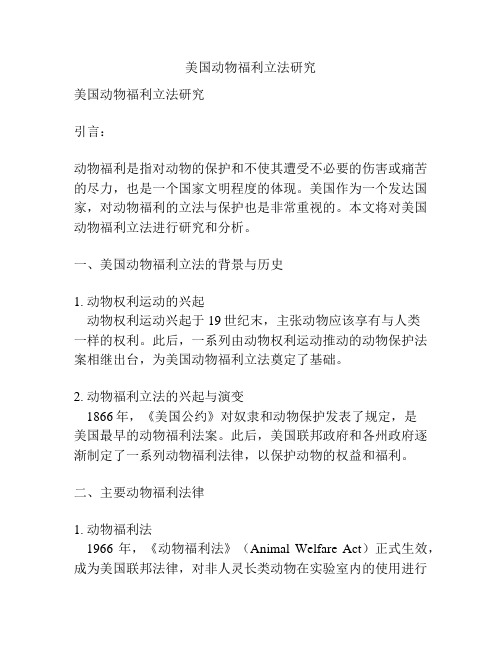
美国动物福利立法研究美国动物福利立法研究引言:动物福利是指对动物的保护和不使其遭受不必要的伤害或痛苦的尽力,也是一个国家文明程度的体现。
美国作为一个发达国家,对动物福利的立法与保护也是非常重视的。
本文将对美国动物福利立法进行研究和分析。
一、美国动物福利立法的背景与历史1. 动物权利运动的兴起动物权利运动兴起于19世纪末,主张动物应该享有与人类一样的权利。
此后,一系列由动物权利运动推动的动物保护法案相继出台,为美国动物福利立法奠定了基础。
2. 动物福利立法的兴起与演变1866年,《美国公约》对奴隶和动物保护发表了规定,是美国最早的动物福利法案。
此后,美国联邦政府和各州政府逐渐制定了一系列动物福利法律,以保护动物的权益和福利。
二、主要动物福利法律1. 动物福利法1966年,《动物福利法》(Animal Welfare Act)正式生效,成为美国联邦法律,对非人灵长类动物在实验室内的使用进行了明确的规定与限制。
2. 植物和动物检疫法1912年,《植物和动物检疫法》(Plant and Animal Quarantine Act)颁布,为美国的动物保健工作奠定了基础,主要是为防止传染病的传播而采取的一系列措施。
3. 废弃动物法1971年,《废弃动物法》(Abandoned Animal Act)出台,规定了对于被遗弃或丢弃的动物应当负责的义务,加强了对废弃动物的保护。
4. 美国动物权利法案2019年,《美国动物权利法案》(The Animal Rights Act)提交给国会,主要内容是修改现有的动物福利法律,进一步强化对动物权益的保护,争取动物应享有一旦其权利被侵犯,将立即采取行动。
三、立法的实施与效果1. 立法的实施美国动物福利立法需要多个机构共同参与执法和监督工作,其中包括美国农业部、环境保护局、食品药品监督管理局等。
2. 立法的效果美国立法对动物福利产生了一定的实质影响。
例如,《动物福利法》对实验室内动物的使用进行了严格的规定和限制,减少了动物的痛苦和伤害。
实验动物福利和动物实验的伦理性要求 精品
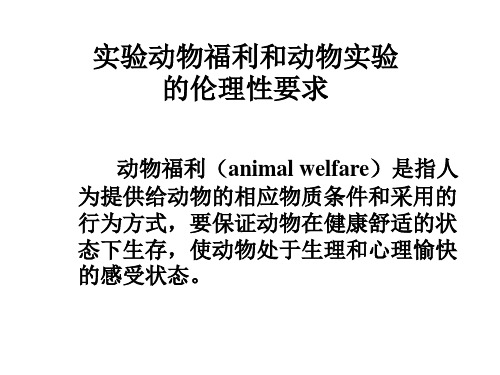
动物福利(animal welfare)是指人 为提供给动物的相应物质条件和采用的 行为方式,要保证动物在健康舒适的状 态下生存,使动物处于生理和心理愉快 的感受状态。
动物福利的渊源和内涵
一、动物福利的渊源
19世纪初,欧洲的一些有识之士最早把同情的目光投向动物, 并在法律实践中解决这个道德议题。1809年一位英国的勋爵 提出一项法案,要求禁止虐待动物。这项法案在当时遭到人 们的嘲笑,结果,虽然在上院获得通过,但在下院被否决。 但是,随着时间的推移,社会的进步,人们关于动物利益的 思考渐趋成熟。1822年,“人道主义者”马丁提出禁止虐待 动物议案,真正获得上下两院通过,这项法案就叫《马丁法》 (Martin Act)。马丁法是世界上第一个反对虐待动物的法 律,首次认定虐待动物本身是一种犯罪,是动物福利保护史 上的里程碑。人们对待动物的态度从此开始了微妙的变化。 《马丁法》不仅影响到英国的民众,也影响到其他国家。 1850年,法国通过了反虐待动物法律。与此同时,爱尔兰、 德国、奥地利、比利时和荷兰等国家相继也通过了反虐待动 物法律。1866年,美国成立了“禁止虐待动物协会”,并迅 速通过了《反虐待动物法案》。
二、动物福利的内涵 动物福利,一般强调保证动物健康、快乐的外部条件。 当外部条件无法满足动物的健康、快乐时,就标志着动物 福利的恶化。 满足动物的需求是保障动物福利的首要原则。动物的 需求主要表现在以下三个方面:维持生命需要、维持健康 需要和维持舒适需要。这三个方面决定了动物的生活质量。 人为地改变或限制动物的这些需要,会造成动物行为和生 理方面的异常,影响动物的健康,影响我们科学实验的真 实性 。
实验动物疼痛-不可忽视的伦理学问题
在这些所有的不愉快条件、感觉或事件中疼痛是最 受到伦理学的关注,因为它本身本质上的恶,和可能 是引起上述其它坏事后果的原因。至少100年来西方社 会的大多数公众包括科研工作人员,还是认为他们对 动物负有的伦理责任,是不得引起动物不必要或不合 理的疼痛。关于动物使用的法律法规也将重点放在动 物疼痛的伦理学问题上,要求合法目的地使用动物尽 可能不引起动物疼痛,以及如果无法避免,不得引起 动物不必要的疼痛。也就是说在实验动物福利保证和 动物实验伦理学的框架内,疼痛是最敏感的伦理问题。
世界各国动物福利立法探析
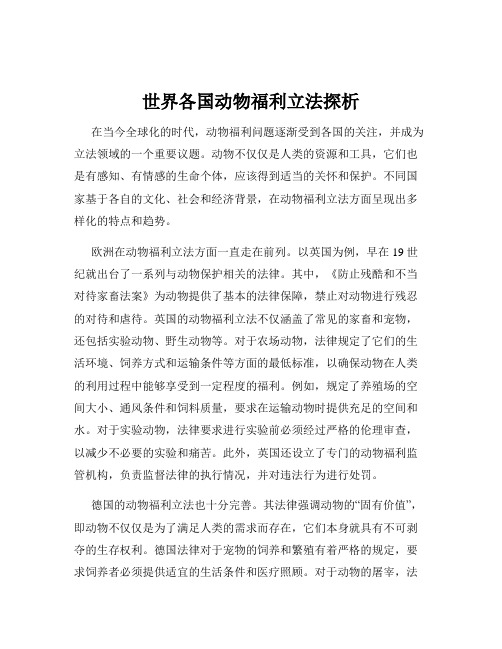
世界各国动物福利立法探析在当今全球化的时代,动物福利问题逐渐受到各国的关注,并成为立法领域的一个重要议题。
动物不仅仅是人类的资源和工具,它们也是有感知、有情感的生命个体,应该得到适当的关怀和保护。
不同国家基于各自的文化、社会和经济背景,在动物福利立法方面呈现出多样化的特点和趋势。
欧洲在动物福利立法方面一直走在前列。
以英国为例,早在 19 世纪就出台了一系列与动物保护相关的法律。
其中,《防止残酷和不当对待家畜法案》为动物提供了基本的法律保障,禁止对动物进行残忍的对待和虐待。
英国的动物福利立法不仅涵盖了常见的家畜和宠物,还包括实验动物、野生动物等。
对于农场动物,法律规定了它们的生活环境、饲养方式和运输条件等方面的最低标准,以确保动物在人类的利用过程中能够享受到一定程度的福利。
例如,规定了养殖场的空间大小、通风条件和饲料质量,要求在运输动物时提供充足的空间和水。
对于实验动物,法律要求进行实验前必须经过严格的伦理审查,以减少不必要的实验和痛苦。
此外,英国还设立了专门的动物福利监管机构,负责监督法律的执行情况,并对违法行为进行处罚。
德国的动物福利立法也十分完善。
其法律强调动物的“固有价值”,即动物不仅仅是为了满足人类的需求而存在,它们本身就具有不可剥夺的生存权利。
德国法律对于宠物的饲养和繁殖有着严格的规定,要求饲养者必须提供适宜的生活条件和医疗照顾。
对于动物的屠宰,法律规定必须采用人道的方式,尽量减少动物的痛苦。
在德国,如果发现有人虐待动物,不仅会面临高额罚款,还可能被判处监禁。
相比之下,美国的动物福利立法则更加注重动物在商业活动中的保护。
例如,在畜牧业中,法律规定了动物的饲养密度、运输时间和屠宰方式等,以保障动物的健康和福利。
对于宠物行业,美国也有一系列的法律法规,包括宠物的销售、领养和医疗等方面。
同时,美国的动物福利立法还涉及到动物表演、动物竞赛等领域,对这些活动中的动物保护做出了明确的规定。
然而,美国的动物福利立法在联邦层面和各州层面存在一定的差异,导致在某些情况下法律的执行和监管可能会出现不一致的情况。
美国保护狗的法律规定(3篇)

第1篇一、引言狗是人类最忠诚的朋友,与人类共同生活了数千年。
然而,在享受狗带来的欢乐的同时,狗的权益保护问题也日益凸显。
美国作为世界上宠物市场最发达的国家之一,对狗的保护法律体系较为完善。
本文将详细介绍美国保护狗的法律规定,以期为我国提供借鉴。
二、美国保护狗的法律体系1.联邦法律(1)动物福利法(Animal Welfare Act)1970年,美国国会通过了《动物福利法》,该法规定了动物福利的基本标准,旨在保障动物在运输、展示、实验、销售等方面的权益。
该法适用于商业用途的动物,包括狗、猫、马、兔子等。
(2)濒危物种法(Endangered Species Act)1973年,美国国会通过了《濒危物种法》,该法旨在保护濒危物种及其栖息地,禁止非法捕猎、贸易和运输濒危物种。
该法对狗的保护起到了间接作用,因为许多狗的品种属于濒危物种。
2.州法律美国各州根据本州实际情况,制定了相应的狗保护法律。
以下列举几个具有代表性的州法律:(1)加利福尼亚州加利福尼亚州对狗的保护法律较为严格,包括《加利福尼亚州动物保护法》和《加利福尼亚州狗法》等。
这些法律对狗的饲养、交易、训练、医疗等方面做出了详细规定。
(2)纽约州纽约州《动物福利法》规定了狗的饲养、交易、运输等方面的要求,同时对虐待动物的行为进行了严厉打击。
(3)佛罗里达州佛罗里达州《动物福利法》对狗的饲养、交易、展示等方面进行了规范,同时对虐待动物的行为进行了严厉处罚。
3.地方法律美国各城市和县根据当地实际情况,制定了相应的狗保护法规。
以下列举几个具有代表性的地方法律:(1)纽约市纽约市《动物控制法》对狗的饲养、管理、领养等方面进行了规定,同时对虐待动物的行为进行了严厉打击。
(2)洛杉矶市洛杉矶市《动物控制法》对狗的饲养、管理、领养等方面进行了规定,同时对流浪狗的收容、救助等方面进行了规范。
三、美国保护狗的法律规定内容1.饲养管理(1)狗的饲养环境:美国法律要求狗的饲养环境应满足以下条件:清洁、舒适、安全,避免疾病传播。
论我国动物保护立法的基本原则——源于对美国联邦动物福利法的思考
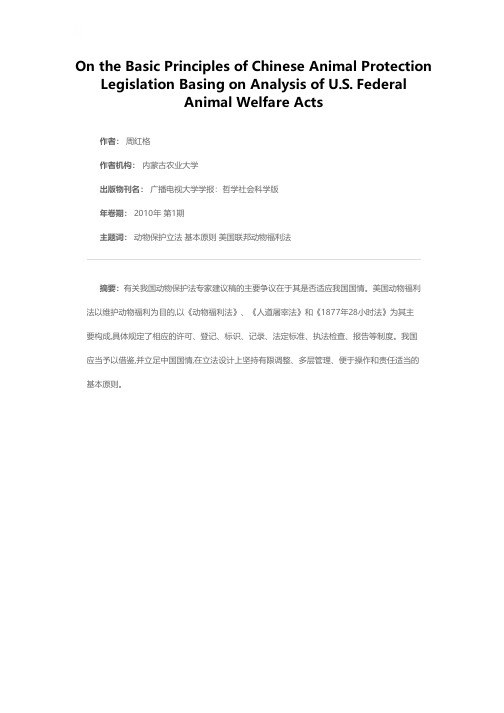
On the Basic Principles of Chinese Animal Protection Legislation Basing on Analysis of U.S. Federal
Animal Welfare Acts
作者: 周红格
作者机构: 内蒙古农业大学
出版物刊名: 广播电视大学学报:哲学社会科学版
年卷期: 2010年 第1期
主题词: 动物保护立法 基本原则 美国联邦动物福利法
摘要:有关我国动物保护法专家建议稿的主要争议在于其是否适应我国国情。
美国动物福利法以维护动物福利为目的,以《动物福利法》、《人道屠宰法》和《1877年28小时法》为其主要构成,具体规定了相应的许可、登记、标识、记录、法定标准、执法检查、报告等制度。
我国应当予以借鉴,并立足中国国情,在立法设计上坚持有限调整、多层管理、便于操作和责任适当的基本原则。
联邦德国动物保护法
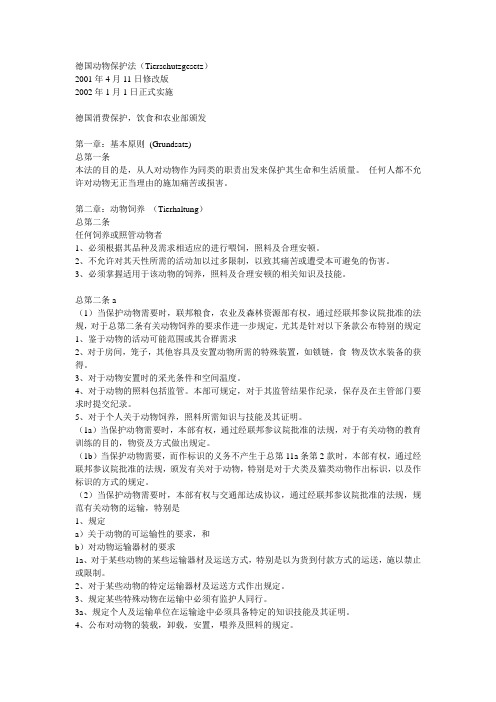
德国动物保护法(Tierschutzgesetz)2001年4月11日修改版2002年1月1日正式实施德国消费保护,饮食和农业部颁发第一章:基本原则(Grundsatz)总第一条本法的目的是,从人对动物作为同类的职责出发来保护其生命和生活质量。
任何人都不允许对动物无正当理由的施加痛苦或损害。
第二章:动物饲养(Tierhaltung)总第二条任何饲养或照管动物者1、必须根据其品种及需求相适应的进行喂饲,照料及合理安顿。
2、不允许对其天性所需的活动加以过多限制,以致其痛苦或遭受本可避免的伤害。
3、必须掌握适用于该动物的饲养,照料及合理安顿的相关知识及技能。
总第二条a(1)当保护动物需要时,联邦粮食,农业及森林资源部有权,通过经联邦参议院批准的法规,对于总第二条有关动物饲养的要求作进一步规定,尤其是针对以下条款公布特别的规定1、鉴于动物的活动可能范围或其合群需求2、对于房间,笼子,其他容具及安置动物所需的特殊装置,如锁链,食物及饮水装备的获得。
3、对于动物安置时的采光条件和空间温度。
4、对于动物的照料包括监管。
本部可规定,对于其监管结果作纪录,保存及在主管部门要求时提交纪录。
5、对于个人关于动物饲养,照料所需知识与技能及其证明。
(1a)当保护动物需要时,本部有权,通过经联邦参议院批准的法规,对于有关动物的教育训练的目的,物资及方式做出规定。
(1b)当保护动物需要,而作标识的义务不产生于总第11a条第2款时,本部有权,通过经联邦参议院批准的法规,颁发有关对于动物,特别是对于犬类及猫类动物作出标识,以及作标识的方式的规定。
(2)当保护动物需要时,本部有权与交通部达成协议,通过经联邦参议院批准的法规,规范有关动物的运输,特别是1、规定a)关于动物的可运输性的要求,和b)对动物运输器材的要求1a、对于某些动物的某些运输器材及运送方式,特别是以为货到付款方式的运送,施以禁止或限制。
2、对于某些动物的特定运输器材及运送方式作出规定。
- 1、下载文档前请自行甄别文档内容的完整性,平台不提供额外的编辑、内容补充、找答案等附加服务。
- 2、"仅部分预览"的文档,不可在线预览部分如存在完整性等问题,可反馈申请退款(可完整预览的文档不适用该条件!)。
- 3、如文档侵犯您的权益,请联系客服反馈,我们会尽快为您处理(人工客服工作时间:9:00-18:30)。
The translation has been initializedand co-financed by Interpharma.English is not an official language of the Swiss Confederation. This translation is provided for information purposes only and has no legal force.Animal Welfare Actof 16 December 2005 (position as at 1 January 2011)The Federal Assembly of the Swiss Confederation,based on Articles 80, paragraphs 1 and 2, and 120, paragraph 2 of the Federal Constitution1,after consideration of a report submitted by the Federal Council, dated 9 December 20022, decrees:Chapter 1: General provisionsArticle 1 PurposeThe purpose of this Act is to protect the dignity and welfare of animals.Article 2 Scope1 The Act applies to vertebrates. The Federal Council decides to which invertebrates it applies and to what extent. In doing so, it is guided by scientific knowledge on the sensitivity of invertebrate animals.2 The following are reserved: the Hunting Act of 20 June 19863, the Federal Act of 1 July 19664 on Nature and Heritage Conservation, the Federal Act of 21 June 19915 on Fishing, the Vocational Training Act of 13 December 20026 and the Epizootic Diseases Act of 1 July 19667.AS 2008 29651 SR 1012 BBl 2003 6573 SR 922.04 SR 4515 SR 923.06 SR 412.107 SR 916.40Article 3 DefinitionsIn this Act, the following terms are defined as follows:a. dignity: Inherent worth of the animal that has to be taken into account when handlingit. If any stress imposed on the animal cannot be justified by overriding interests, this constitutes a disregard for the animal’s dignity. Stress is deemed to be present in particular if pain, suffering or harm is inflicted on the animal, if it is exposed to anxiety or humiliation, if there is major interference with its appearance or its abilities or if it is excessively instrumentalised;b. well-being: The well-being of animals is given if1.the husbandry and feeding are such that their bodily functions and theirbehaviour are not disturbed and excessive demands are not made on theiradaptability,2.species-appropriate behaviour within the limits of their biological adaptability isguaranteed,3.they are clinically healthy,4.pain, suffering, harm and anxiety are avoided;c. animal experiment: Any measure in which a live animal is used with the aim of1.testing a scientific assumption,2.observing the effect of a particular measure in the animal,3.testing a substance,4.obtaining or testing cells, organs or bodily fluids, except when this is in thecontext of agricultural production, diagnostic or curative operations on theanimal or for determining the health status of animal populations,5.obtaining or replicating organisms alien to the species in question,6.teaching or training.Article 4 Principles1 Anyone who handles animals hasa.to take account of their needs as best as possible; andb.to ensure their well-being as far as the intended purpose allows.2 No one may inflict pain, suffering or harm on an animal, induce anxiety in an animal or disregard its dignity in any other way without justification. The mishandling, neglect or unnecessary overworking of animals is forbidden.3 The Federal Council forbids any further activities on animals if their dignity is thereby disregarded.Article 5 Training and information1 The Federal Government may promote the training and continuing education of people who handle animals.2 It ensures that the public are informed about animal welfare issues.Chapter 2: Handling of AnimalsSection 1: Animal HusbandryArticle 6 General provisions1Anyone who keeps or looks after animals must feed and care for them properly and provide them with the activities and freedom of movement needed for their well-being, as well as shelter where necessary.2 Having consulted the various interest groups, the Federal Council shall issue regulations, and in particular minimum requirements, on the keeping of animals in line with scientific thinking and with the state of the art and technical developments. It prohibits forms of animal husbandry that contravene the basic principles of animal welfare.3 It may define the requirements for the training and continuing education of animal keepers and persons who train animals.Article 7 Reporting and licence obligations1 The Federal Council may make certain types of animal husbandry and the keeping of certain animal species subject to the fulfilment of reporting or licence obligations.2 The placing on the market of mass-produced housing systems and installations for farm animals requires a federal licence. The licence is only granted if the systems and facilities meet the requirements of species-appropriate husbandry. The Federal Council regulates the approval procedure and determines the farm animals to which the procedure is applicable. It may allow exemptions from licence obligations for certain types of animal husbandry.3 A licence is required for the commercial and private keeping of wild animals that pose particular challenges in terms of husbandry and care.Article 8 Investment protectionFollowing construction, buildings and installations for farm animals licensed in accordance with this Act may be used for at least their normal depreciable life.Article 9 Animal care takersThe Federal Council may define the areas other than agriculture in which the use of animal care takers is necessary.Section 2: Animal Breeding and Genetic ModificationArticle 10 Breeding and generation of animals1 The use of natural and artificial methods of breeding and reproduction must not cause any pain, suffering, harm or behavioural disorders in the parent animals or their offspring that results from or is associated with the breeding objective, subject to the provisions on animal experiments.2 The Federal Council issues regulations on the breeding and generation of animals and defines the criteria for assessing the reliability of breeding objectives and reproduction methods; in doing so it takes account of the dignity of the animal. It may prohibit the breeding, production and keeping of animals with certain traits, in particular physical and behavioural abnormalities.Article 11 Licence requirement for genetically modified animals1 Anyone who produces, breeds, keeps, manages or trades in genetically modified animals requires a cantonal licence. Anyone who produces, breeds, keeps or trades in such animals for the purpose of research, therapy or diagnostics requires a cantonal licence according to Article 19, paragraph 1. In other cases, the approval procedure is based on the provisions governing animal experiments and on the Genetic Engineering Act of 21 March 20038.2 Having consulted the various interest groups, the Federal Ethics Committee on Non-Human Gene Technology, the Swiss Expert Committee for Biosafety and the Swiss Committee on Animal Experiments, the Federal Council shall define the criteria for weighing the constraints on the animals against the benefits for research in the production, breeding, keeping and use of genetically modified animals and trading in such animals.3 The Federal Council regulates the requirements binding on the institutes in which activities as defined in paragraph 1, second sentence, are performed, and in particular the requirements with regard to infrastructure, personnel, supervision and documentation.4 It may allow exemptions to the licence obligation or simplifications in the approvals procedure, particularly if it is found that no pain, suffering, harm or behavioural disorders occur in the animal as a result of the production and breeding methods and that the dignity of the animal is otherwise taken into account.Article 12 Reporting obligation1The cantonal authority must be notified about genetically modified animals on which pain, suffering, harm or behavioural disorders are inflicted as a result of production or breeding or whose dignity is violated in other ways.2 The cantonal authority submits these reports to the cantonal commission for animal experiments and decides on the admissibility of further breeding based on the application.3 The Federal Council regulates the details of the report.Section 3: Trade in AnimalsArticle 13 Authorisation systemA licence is required for commercial trading in animals and the use of live animals for advertising purposes.Article 14 International trade1 For reasons of animal welfare and species conservation, the Federal Council may attach conditions to, restrict or prohibit the import, transit and export of animals and animal products. The foregoing does not apply to kosher or halal meat, in order to ensure an adequate supply of such meat to the Jewish and Islamic communities. The authorisation to import and obtain such products is reserved to members of these communities and associated legal entities and partnerships.2 It is forbidden to import dog and cat fur as well as products made therefrom.8 SR 814.91Section 4: Transport of AnimalsArticle 151 Animals must be transported under protected conditions and without unnecessary delay. The travelling time from the place of loading must not be more than six hours. The Federal Council shall issue provisions on exemptions.2 Having consulted the various industry organisations, the Federal Council shall regulate requirements with regard to the training and continuing education of personnel entrusted with the professional transport of animals.Section 5: Surgical Operations Performed on AnimalsArticle 16Painful surgical procedures may only be performed under general or local anaesthesia administered by a specialist. The Federal Council shall determine any exceptions. It determines which persons are deemed to be specialists. This clause is subject to the provisions of this Act relating to animal experiments.Section 6: Animal ExperimentsArticle 17 Limitation to the indispensable minimumAnimal experiments which inflict pain, suffering or harm on the animal, induce anxiety in the animal, substantially impair its general well-being or disregard its dignity in any other way must be limited to the indispensable minimum.Article 18 Licence obligation1 Anyone who wants to conduct animal experiments requires a licence from the responsible cantonal authorities.2 Activities as defined in Article 11, paragraph 1, last sentence, are equivalent to animal experiments within the scope of the approvals procedure.3 The responsible cantonal authority submits licence applications for animal experiments as defined in Article 17 to the cantonal commission for animal experiments.4 Licences are issued for a limited period. They may be subject to conditions and requirements.5 Institutes and laboratories which conduct animal experiments and also housing facilities for laboratory animals must conduct an inspection of the animal population.Article 19 Requirements1The Federal Council defines the requirements for institutes and laboratories in which animal experiments may be conducted with regard to the training and continuing education of personnel and in respect of laboratory animal housing, breeding and operations.2 The Federal Council defines the criteria for assessing indispensability within the meaning of Article 17.3 It may declare certain experimental purposes to be impermissible.4 An animal experiment is impermissible in particular if, in relation to the anticipated gain in knowledge, it inflicts disproportionate pain, suffering or harm or induces disproportionate anxiety in the animal.Article 20 Conduct of experiments1 Pain, suffering or harm may be inflicted on or anxiety caused to an animal only if this is unavoidable for the purpose of the experiment.2 Experiments on animals relatively high on the evolutionary scale may only be carried out if the purpose of the experiment cannot be achieved in animal species that are lower on the evolutionary scale and no suitable alternative methods are available.3 The Federal Council regulates the further requirements on the conduct of experiments.Section 7: Slaughter of AnimalsArticle 211 Mammals must not be slaughtered unless they have been stunned before the start of exsanguination.2 The Federal Council may also stipulate that other animals must be stunned before they are slaughtered.3 The Federal Council specifies the permitted methods of stunning.4 Having consulted the various industry organisations, the Federal Council regulates the requirements with regard to the training and continuing education of slaughterhouse personnel.Chapter 3: ResearchArticle 221 The Federal Government operates and supports scientific research of relevance to animal welfare.2 In collaboration with universities and industry, the Federal Government in particular promotes the development, accreditation and application of methods which replace animal experiments, which enable fewer animals to be used or which result in less stress for the animals. In particular, it promotes research projects aimed at eliminating pain, suffering or anxiety in surgical procedures as defined in Article 16.Chapter 4: Administrative and Public Authority AppealsArticle 23 Ban on the keeping of animals1 The authorities responsible may ban personsa.who have been punished because of repeated or serious violations of the provisionsset forth in this Act and its enactments or of decrees, orb.who are incapable of keeping or breeding animals for other reasonsfrom keeping or breeding animals, or trading in or working professionally with animals fora specified or unspecified period.2 If such a ban is imposed by one canton, it applies throughout Switzerland.3 The federal authorities responsible keep a list of the bans that have been imposed. This may be inspected by the cantonal authorities responsible for issuing such bans if there is a suspicion that persons who have moved to a canton are in violation of the animal husbandry provisions of this Act.Article 24 Regulatory intervention1If it is found that animals are being neglected or kept under completely unsuitable conditions, the responsible authorities must intervene immediately. They may confiscate the animals as a precautionary measure and house them at a suitable place at the expense of the animal keeper; if necessary, they must arrange for the animals to be sold or euthanised. For this they may enlist the assistance of police authorities.2 After the costs of the procedure have been deducted, the proceeds from any such transaction go to the keeper.3 If a deliberate punishable violation of the provisions set forth in this act comes to light, the authorities responsible for enforcement of the animal welfare regulations must report the offence.Article 25 Public authority appeals1 The federal authorities responsible may lodge a formal appeal under cantonal and federal law against decisions made by cantonal authorities with regard to animal experiments.2 The cantonal authorities must immediately inform the responsible authorities of their decisions.Chapter 5: Criminal Provisions9Article 26 Maltreatment of animals1 Anyone who wilfullya.mistreats or neglects an animal, unnecessarily overworks it or in any other waydisregards its dignity;b.deliberately and without provocation kills an animal in a manner that causes itsuffering;anises fights between or with animals in which animals are tormented or killed;d.inflicts pain, suffering or harm on an animal or induces anxiety in it during thecourse of experiments, unless this is unavoidable for the purpose of the experiment;e.abandons or leaves behind an animal that is kept in the house or on the farm with theintention of disposing of itis liable to a term of imprisonment or a fine2 If the offender acts through negligence, he is liable to a term of detention or a fine of up to 20,000 francs.Article 27 Offences committed in international trade1Anyone who violates the Convention of 3 March 197310on International Trade in Endangered Species of Wild Fauna and Flora (CITES) by wilfully importing, exporting, transporting through the country or taking into possession animals or animal products as defined in Annexes I–III of the Convention is liable to a term of imprisonment or a fine. If the offender has acted through negligence, he is liable to a term of detention or a fine of up to 20,000 francs.2 Anyone who wilfully violates the provisions on international trade (Article 14) is liable toa term of imprisonment or a fine of up to 20,000 francs. Attempting or aiding and abetting the commission of an offence is also an offence. If the offender has acted through negligence, he is liable to a term of detention or a fine of up to 20,000 francs.Article 28 Other offences1 Anyone who wilfullya.disregards the regulations on the keeping of animals;b.violates the regulations on breeding or producing animals;c.violates the regulations on producing, breeding, keeping, trading in or usinggenetically modified animals;d.violates the regulations on the transport of animals;e.violates the regulations on surgical procedures on animals or animal experiments;f.violates the regulations on the slaughter of animals;g.performs other actions on animals that are forbidden by this Act or the Ordinanceis liable to a term of imprisonment or a fine, unless Article 26 is applicable9The threatened penalties shall be interpreted according to Article 333 Paragraphs 2–5 of the Penal Code (SR 311.0) in the Federal Council version of 13 Dec. 2002 (AS 2006 3459; BBl 1999 1979).10 SR 0.4532 Attempting or aiding and abetting the commission of an offence is also an offence. If the offender acts through negligence, he is liable to a term of detention or a fine of up to20,000 francs.3 Anyone who, in any other manner, wilfully or through negligence violates this Act, its enforcement regulations or an individual decision of which he has been notified that carries the sanctions provided for in this Article is liable to a fine.Article 29 Statute of limitationsThe statute of limitations is five years for the prosecution of contraventions and four years for the penalties for contraventions.Article 30 Legal entities and partnershipsArticle 6 of the Federal Act of 22 March 197411 on Administrative Criminal Law applies.Article 31 Prosecution1 The prosecution and judgment of offences is a matter for the cantons. (12)2 The federal authority responsible investigates and judges violations as defined in Article 27. If there has at the same time been a violation of the Customs Act of 18 March 200513, the Federal Customs Administration conducts the investigation and decides on the penalty.3 If a violation simultaneously constitutes a violation as defined in paragraph 2 and a violation to be prosecuted by the federal authority of the Customs Act of 18 March 2005, the Foodstuffs Act of 9 October 199214, the Animal Health Act of 1 July 196615, the Hunting Act of 20 June 198615 or the Federal Act of 21 June 199117 on Fishing, then the penalty for the severest violation applies; it may be increased appropriately.11 SR 313.012 Superseded by Annex section II 12 of the law on the organization of the penal authorities dated 19March 2010, effective from 1 Jan. 2011 (AS 2010 3267; BBl 2008 8125).13 SR 631.014 SR 817.015 SR 916.4016 SR 922.017 SR 923.0Chapter 6: Final ProvisionsSection 1: EnforcementArticle 32 Enforcement by the Federal Government and cantons1 The Federal Council issues enforcement regulations. It may authorise the federal authority responsible to issue implementing regulations of a technical nature.2 Enforcement is the responsibility of the cantons unless the law stipulates otherwise. They may regionalise enforcement.3 The Federal Council determines the extent to which animal holdings must be inspected and how the conduct of animal experiments must be monitored. The inspection of animal husbandries and corresponding data gathering must be coordinated with the inspections that are required under the legislation on agriculture, animal health and food.4 The Federal Council regulates the training and continuing education of the enforcement authorities.5 Enforcement at the customs frontier, the procedure for authorisation within the scope of Article 7 paragraph 2 and the monitoring of international trade in animals and animal products are the responsibility of the Federal Government.Article 33 Cantonal technical officeEach canton must set up a technical office for which the Cantonal Veterinary Officer is responsible and which is suitable for ensuring that this Act and the regulations issued on the basis of this Act are enforced.Article 34 Cantonal Committee on Animal Experiments1Each canton shall appoint a committee of experts for animal experiments which is independent of the licensing authority and is appropriately represented in the animal welfare organisations. Two or more cantons may appoint a joint committee.2 The committee reviews applications and submits a proposal to the licensing authority. It is consulted on the inspection of laboratory animal husbandries and the conduct of experiments. The cantons may entrust further duties to the committee.Article 35 Federal Committee on Animal Experiments1 The Federal Council shall appoint a committee of experts on animal experiments which advises the federal authority responsible and places itself at the disposal of the cantons for questions of a fundamental nature and controversial cases.2 The Federal Committee on Animal Experiments collaborates with the federal ethics committee for biotechnology in the non-human area.Article 36 Animal experiment statisticsThe federal authority responsible publishes annual statistics on all animal experiments conducted in Switzerland. It informs the public about issues concerning animal experiments and genetic modifications in animals.Article 37 Agreement on objectivesThe Federal Council may conclude agreements with the cantons on objectives for the enforcement of parts of this Act.Article 38 Co-determination of organisations and companies1The Federal Government and cantons may consult organisations and companies on enforcement of the Act or may establish organisations suitable for this purpose.2 They supervise the co-determination of these organisations and companies. The duties and authority assigned to them must be defined in a mission statement by the authority responsible. They must provide this authority with details of their business management and accounting. The parliamentary control of federal and cantonal government remains unaffected by this provision.3 The Federal Council and the cantons may authorise the relevant organisations and companies to charge fees for their activities.Article 39 Right of accessThe authorities instructed to enforce this Act have access to premises, facilities, vehicles, articles and animals; in doing so, they act as an agency of the judicial police.Article 40 Supervision by the Federal GovernmentEnforcement of this Act by the cantons is supervised on behalf of the Federal Government by the Department of Economic Affairs.Article 41 Fees1 Unless it stipulates otherwise, this Act is enforced free of charge.2 The cantons are authorised to levy fees fora.licences and official decisions;b.inspections which result in complaints;c.special services which entail expenditure beyond the normal functions of office.3 The Federal Council defines the limits for cantonal fees.Article 42 Cantonal regulations1 If this Act requires supplementation by cantonal law in order for it to be implemented, the cantons are obliged to draw up the relevant regulations.2 The cantons notify the Department of Economic Affairs of the implementing regulations.Section 2:Repeal of Existing Law and Transitional RegulationsArticle 43 Repeal of existing lawThe Animal Protection Law of 9 March 197818 is repealed.Article 44 Transitional regulations in relation to Article 16The surgical castration of piglets without stunning is forbidden as from 1 January 2009. If no practical alternative method is available by this date, the Federal Council may postpone the entry into force of this ban by not more than two years.Article 45 Transitional regulations with regard to legal protectionUntil the entry into force of the Administrative Court Act of 17 June 200519, legal protection is regulated, in addition to the general provisions on the administration of federal justice, as follows: the Appeals Commission of the Department of Economic Affairs assesses appeals against decisions of the Federal Veterinary Office.Section 3: Referendum and CommencementArticle 461 This Act is subject to an optional referendum.2 It will not be published in the Federal Gazette until the Popular Initiative “In favour of modern animal protection (Tierschutz-Ja!)” has been withdrawn or rejected20.3 The Federal Council determines the commencement date.Commencement date; 1 September 20082118 [AS 1981 562, 1991 2345, 1995 1469, Art. 59 section. 1, 2003 4181 4803 Annex section 3, 2006 2197Annex section 45]19 BBl 2005 4093 414620 The popular initiative was withdrawn (see BBl 2006 355).21 BRB 23 April 2008。
